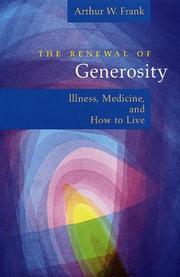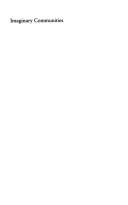| Listing 1 - 5 of 5 |
Sort by
|
Book

ISBN: 3110400308 3110378728 Year: 2022 Publisher: Berlin ; Boston : De Gruyter,
Abstract | Keywords | Export | Availability | Bookmark
 Loading...
Loading...Choose an application
- Reference Manager
- EndNote
- RefWorks (Direct export to RefWorks)
Literary theory flourished in Central and Eastern Europe throughout the twentieth century, but its relation to Western literary scholarship is complex. This book sheds light on the entangled histories of exchange and influence both within the region known as Central and Eastern Europe, and between the region and the West. The exchange of ideas between scholars in the East and West was facilitated by both personal and institutional relations, both official and informal encounters. For the longest time, however, intellectual exchange was thwarted by political tensions that led to large parts of Central and Eastern Europe being isolated from the West. A few literary theories nevertheless made it into Western scholarly discourses via exiled scholars. Some of these scholars, such as Mikhail Bakhtin, become widely known in the West and their thought was transposed onto new, Western cultural contexts; others, such as Ol’ga Freidenberg, were barely noticed outside of Russian and Poland. This volume draws attention to the schools, circles, and concepts that shaped the development of theory in Central and Eastern Europe as well as the histoire croisée – the history of translations, transformations, and migrations – that conditioned its relationship with the West.
Book
ISBN: 1618111833 1618116754 9781618111616 9781618111838 9781618116758 1618111612 1618118099 Year: 2013 Publisher: Boston, Mass. Academic Studies Press
Abstract | Keywords | Export | Availability | Bookmark
 Loading...
Loading...Choose an application
- Reference Manager
- EndNote
- RefWorks (Direct export to RefWorks)
This far-ranging study develops Morson's concept of "prosaics," which stresses the importance of ordinary events and the novel's unique ability to portray them. Arguing that time is open and contingency real, Morson develops a "prosaics of process" showing how some masterpieces have found an alternative to structure. His well-known pseudonym Alicia Chudo, the inventor of "misanthropology," explores the disturbing philosophical content of laughter, disgust, and even empathy. Northwestern University's most popular professor, Morson attributes declining student interest in literature to current teaching methods. He argues in favor of showing how literature fosters empathy with people unlike ourselves. Ever playful, Morson explores the relation of games to wit, which expresses the power of the mind to triumph over contingency in the social world.
Fiction --- Prose literature --- Events (Philosophy) in literature --- Empathy in literature --- History and criticism. --- History and criticism --- Theory, etc. --- Thematology --- Literature --- Arts --- Literary Criticism --- Fyodor Dostoevsky --- God --- Leo Tolstoy --- Mikhail Bakhtin

ISBN: 0226260259 9780226260259 0226260151 9780226260150 Year: 2004 Publisher: Chicago : University of Chicago Press,
Abstract | Keywords | Export | Availability | Bookmark
 Loading...
Loading...Choose an application
- Reference Manager
- EndNote
- RefWorks (Direct export to RefWorks)
Contemporary health care often lacks generosity of spirit, even when treatment is most efficient. Too many patients are left unhappy with how they are treated, and too many medical professionals feel estranged from the calling that drew them to medicine. Arthur W. Frank tells the stories of ill people, doctors, and nurses who are restoring generosity to medicine-generosity toward others and to themselves. The Renewal of Generosity evokes medicine as the face-to-face encounter that comes before and after diagnostics, pharmaceuticals, and surgeries. Frank calls upon the Roman emperor Marcus Aurelius, philosopher Emmanuel Levinas, and literary critic Mikhail Bakhtin to reflect on stories of ill people, doctors, and nurses who transform demoralized medicine into caring relationships. He presents their stories as a source of consolation for both ill and professional alike and as an impetus to changing medical systems. Frank shows how generosity is being renewed through dialogue that is more than the exchange of information. Dialogue is an ethic and an ideal for people on both sides of the medical encounter who want to offer more to those they meet and who want their own lives enriched in the process. The Renewal of Generosity views illness and medical work with grace and compassion, making an invaluable contribution to expanding our vision of suffering and healing.
Physician and patient. --- Generosity. --- care ethics, empathy, generosity, healthcare, bedside manner, medicine, illness, disease, treatment, sociology, philosophy, medical professionals, marcus aurelius, emmanuel levinas, mikhail bakhtin, suffering, healing, physician-patient relations, nursing, health sciences, psychology, doctors, pain, communication, patients.
Book
ISBN: 1503609731 9781503609730 9780804785228 0804785228 Year: 2019 Publisher: Stanford, California : Stanford University Press,
Abstract | Keywords | Export | Availability | Bookmark
 Loading...
Loading...Choose an application
- Reference Manager
- EndNote
- RefWorks (Direct export to RefWorks)
Until the 1940s, when awareness of Russian Formalism began to spread, literary theory remained almost exclusively a Russian and Eastern European invention. The Birth and Death of Literary Theory tells the story of literary theory by focusing on its formative interwar decades in Russia. Nowhere else did literary theory emerge and peak so early, even as it shared space with other modes of reflection on literature. A comprehensive account of every important Russian trend between the world wars, the book traces their wider impact in the West during the 20th and 21st centuries. Ranging from Formalism and Bakhtin to the legacy of classic literary theory in our post-deconstruction, world literature era, Galin Tihanov provides answers to two fundamental questions: What does it mean to think about literature theoretically, and what happens to literary theory when this option is no longer available? Asserting radical historicity, he offers a time-limited way of reflecting upon literature—not in order to write theory's obituary but to examine its continuous presence across successive regimes of relevance. Engaging and insightful, this is a book for anyone interested in theory's origins and in what has happened since its demise.
Criticism --- Literature --- Formalism (Literary analysis) --- Evaluation of literature --- Literary criticism --- Rhetoric --- Aesthetics --- Formalism (Russian literature) --- Russian formalism (Literary analysis) --- History --- History and criticism --- Theory, etc. --- Influence. --- Technique --- Evaluation --- Criticism. --- LITERARY CRITICISM / General. --- 1900-1999. --- Russia (Federation). --- Theory, etc --- Influence --- E-books --- Aesthetics. --- Canon Formation. --- Exile. --- Intellectual History. --- Literary Theory. --- Mikhail Bakhtin. --- Regimes of Relevance. --- Russian Formalism. --- Semantic Paleontology. --- World Literature. --- Literature History and criticism

ISBN: 9786612758904 128275890X 0520926765 1597346683 9780520926769 0585466092 9780585466095 9781597346689 9780520228283 0520228286 9780520228290 0520228294 9781282758902 Year: 2002 Publisher: Berkeley : University of California Press,
Abstract | Keywords | Export | Availability | Bookmark
 Loading...
Loading...Choose an application
- Reference Manager
- EndNote
- RefWorks (Direct export to RefWorks)
Drawing from literary history, social theory, and political critique, this far-reaching study explores the utopian narrative as a medium for understanding the social space of the modern nation-state. Considering the narrative utopia from its earliest manifestation in Thomas More's sixteenth-century work Utopia to some of the most influential utopias of the late nineteenth and twentieth centuries, this book is an astute study of a literary genre as well as a nuanced dialectical meditation on the history of utopian thinking as a quintessential history of modernity. As he unravels the dialectics at work in the utopian narrative, Wegner gives an ambitious synthetic discussion of theories of modernity, considering and evaluating the ideas of writers such as Ernst Bloch, Louis Marin, Gilles Deleuze, Walter Benjamin, Martin Heidegger, Henri Lefebvre, Paul de Man, Karl Mannheim, Mikhail Bakhtin, Jürgen Habermas, Slavoj Zizek, and Homi Bhabha.
Community in literature. --- Nationalism in literature. --- Space and time in literature. --- Modernism (Literature) --- Russian fiction --- Comparative literature --- Utopias in literature. --- American fiction --- Utopian literature --- Space and time as a theme in literature --- Crepuscolarismo --- Literary movements --- Community in literature --- History and criticism. --- Russian and American. --- American and Russian. --- More, Thomas, --- Orwell, George, --- Orwell, George. --- Orwell, George --- Orwell, Georg --- Āravēla, Jorja --- Blair, Eric Arthur --- Oruel, G., --- Oravēla, Jyorja --- Orvel, Džordž --- Orṿel, G'org' --- Oruell, Dzhordzh --- Oruel, Dzhordzh --- Ārvel, Jārji --- Ōweru, Jōji --- Ūrvil, Jurj --- Jārj Ārvil --- אורוול, גורג, --- אורוול, ג׳ורג׳ --- אורול, ג׳ורג׳, --- اورويل، جورج --- 奥威尔乔治, --- آرول، جارج، --- Criticism and interpretation. --- Nationalism in literature --- Space and time in literature --- Utopias in literature --- History and criticism --- American and Russian --- Russian and American --- Communities in literature. --- 16th century. --- 19th century. --- 20th century. --- criticism. --- critique. --- cultural history. --- cultural studies. --- ernst bloch. --- gilles deleuze. --- henri lefebvre. --- homi bhabha. --- jurgen habermas. --- karl mannheim. --- literary criticism. --- literary history. --- literary. --- louis marin. --- martin heidegger. --- mikhail bakhtin. --- modernity. --- nation state. --- paul de man. --- philosophical. --- philosophy. --- political. --- politics. --- slavoj zizek. --- social history. --- social studies. --- social theory. --- thomas more. --- utopian narrative. --- utopian theory. --- utopian. --- utopianism. --- walter benjamin.
| Listing 1 - 5 of 5 |
Sort by
|

 Search
Search Feedback
Feedback About UniCat
About UniCat  Help
Help News
News